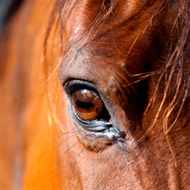
Opportunities for horses more diverse than ever before
Horse owners looking to find new homes for their unwanted equines are being urged to 'do their research' in order to safeguard their animal's future welfare.
Equine charities World Horse Welfare and Retraining of Racehorses (RoR) want horse owners to be aware of the many options available if they are looking to re-home a horse, and the need to carry out thorough checks before entrusting an equine into an organisation or individual's care.
The call follows a number of cases both charities have seen where organisations and individuals have taken on unwanted horses and unfortunately resulted in welfare problems.
Tony Tyler, deputy chief executive of World Horse Welfare explains: “We’ve seen a number of cases over recent years of sanctuaries, not-for-profit organisations and individuals taking in unwanted horses from a range of backgrounds which have resulted in welfare problems for a variety of reasons.
“Some have simply become overwhelmed by the huge time and financial commitments required in caring for these animals, whilst we’ve seen examples of others selling on horses to the open market or masking injuries in an attempt to lure in lucrative private buyers."
RoR recently marked a key milestone with the passing of 11,000 registrations on its database of former racehorses successfully undertaking new careers.
Similarly, World Horse Welfare re-homed a record 313 horses in 2015 to a variety of disciplines, demonstrating the opportunities for horses in need of a new home are more diverse than ever before.
Di Arbuthnot, chief executive of RoR said: "Finding the right home for a horse is so important, but not always that easy. RoR, together with help from World Horse Welfare, has worked hard to promote the adaptability and versatility of thoroughbreds and we are seeing more and more former racehorses thriving in a second career, so there are an increasing number of options now for such horses and less of a role or need for sanctuaries."
There is a section devoted to rehoming advice on the RoR website, including guidelines on how to safeguard a horse’s future and agreements which preclude a horse from racing again.
Tony adds: “If anyone is looking to find a new home for their horse, we’d urge them to carefully consider the various options available and seek the advice of World Horse Welfare or RoR to help in the decision.
"Acting in the best interests of the horse in question should be the main priority whether it be a formerly-raced Thoroughbred or child’s show pony – doing everything possible to safeguard its future welfare is essential.”



 The Federation of Independent Veterinary Practices (FIVP) has announced a third season of its podcast, Practice Matters.
The Federation of Independent Veterinary Practices (FIVP) has announced a third season of its podcast, Practice Matters.